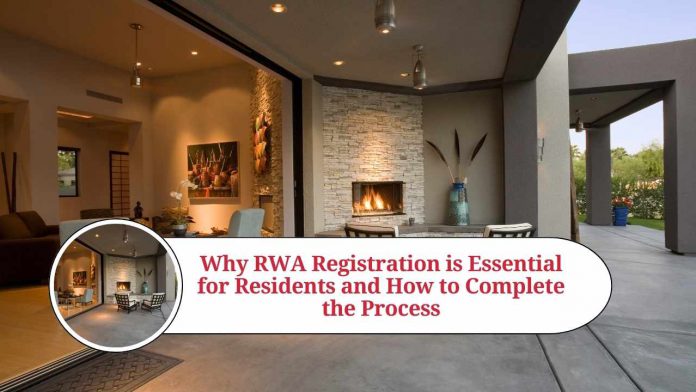If you’re a homeowner or planning to purchase a property in India, it’s essential to understand the significance of RWA registration. The Resident Welfare Association (RWA) is an organization that represents the interests of residents in a particular housing complex or society. It plays a crucial role in ensuring that residents’ welfare is protected, and their rights are upheld. In this blog post, we’ll discuss what RWA registration is and why it’s important.
What is RWA registration?
RWA registration is the process of officially registering the Resident Welfare Association with the appropriate government authority. The registration process may differ from state to state, but generally, it involves submitting the necessary documents, such as the society’s bylaws, and paying the registration fee.
Once the RWA is registered, it becomes a legal entity that can enter into contracts, own property, and sue or be sued in a court of law. The RWA is also responsible for maintaining the common areas and facilities in the housing complex and representing the interests of residents in matters related to the property.
Why is RWA registration important?
RWA registration is important for several reasons, including:
- Legitimacy: Registration gives the RWA legitimacy and makes it a recognized body that can represent the interests of the residents. It also helps build credibility with government authorities, builders, and other stakeholders.
- Representation: An RWA that is registered can represent the residents in legal matters and negotiations with builders, contractors, and government agencies.
- Transparency: Registration brings transparency to the RWA’s operations, as it must maintain proper accounts, hold regular meetings, and report on its activities.
- Accountability: Registered RWAs are accountable to their members, and members have a say in how the association is run.
- Better facilities and services: A registered RWA can access funds and grants from government agencies, which can be used to improve facilities and services in the housing complex.
- Protection of rights: A registered RWA can take legal action on behalf of its members to protect their rights and interests.
In summary
RWA registration is essential for any housing complex or society in India. It gives the RWA legitimacy, transparency, and accountability and helps protect the rights and interests of the residents. If you’re a homeowner or planning to purchase a property, make sure you check if the RWA is registered and if not, encourage the association to do so.
Read more useful content:
Frequently Asked Questions (FAQs)
Q. What is an RWA?
An RWA is a Resident Welfare Association that represents the interests of residents in a particular housing complex or society. It is responsible for maintaining the common areas and facilities and representing the interests of the residents in matters related to the property.
Q. Why is RWA registration important?
RWA registration is important as it gives the association legitimacy, transparency, and accountability. It helps protect the rights and interests of residents and enables the RWA to access funds and grants from government agencies to improve facilities and services in the housing complex.
Q. Who can register an RWA?
Any group of residents living in a housing complex or society can register an RWA. The association must have a minimum number of members, as specified by the state government.
Q. What documents are required for RWA registration?
The required documents may vary from state to state, but generally include the society’s bylaws, minutes of the general body meeting, proof of address of the office-bearers, and proof of ownership of the property.
Q. How long does it take to register an RWA?
The registration process can take up to 30-45 days, depending on the state government’s rules and regulations.
Q. What are the fees for RWA registration?
The registration fee may vary from state to state and depends on the size and location of the housing complex. It is usually a nominal amount.
Q. What are the benefits of RWA registration?
The benefits of RWA registration include legitimacy, transparency, accountability, better facilities and services, protection of rights, and representation in legal matters and negotiations.
Q. Can an unregistered RWA operate?
Yes, an unregistered RWA can operate, but it will not have legal recognition and will not be able to represent the residents in legal matters or access funds and grants from government agencies.
Q. How often does an RWA need to renew its registration?
The registration of an RWA is usually valid for a specific period, after which it needs to be renewed. The renewal period may vary from state to state.
Q. Can a registered RWA be dissolved?
Yes, a registered RWA can be dissolved by its members through a resolution passed in a general body meeting. The dissolution process must be in accordance with the association’s bylaws and the state government’s rules and regulations.




















